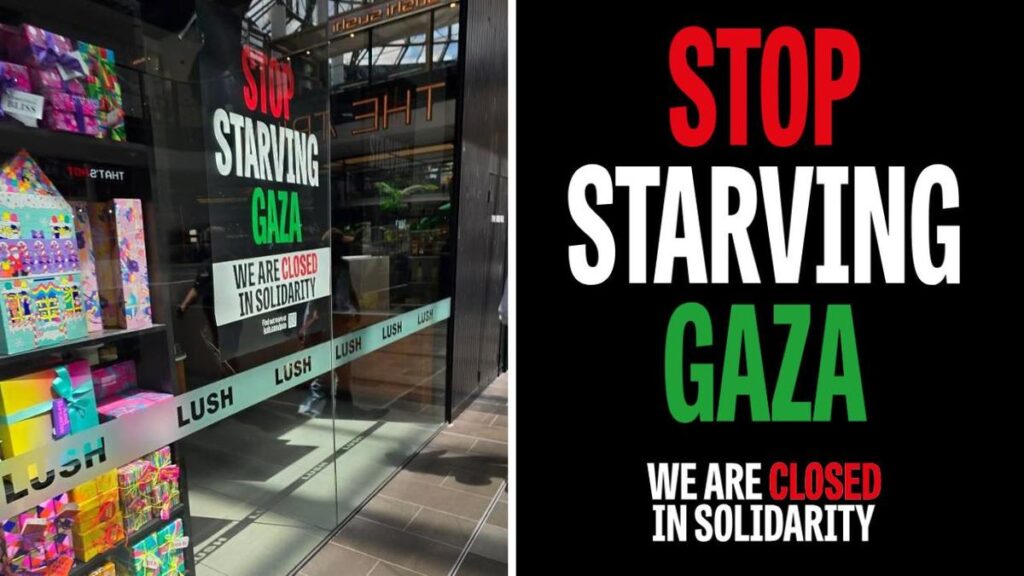
Lush has closed stores and its website in Australia to protest the situation in Gaza.
Popular cosmetics retailer Lush has taken a bold stance by closing its stores across Australia in protest against the ongoing humanitarian crisis in Gaza. On Thursday, customers visiting Lush outlets were greeted with signs declaring, “Stop starving Gaza — We are closed in solidarity.” Similarly, online shoppers encountered a redesigned website echoing the same message of protest.
In addition to closing its retail locations, Lush’s factory in Sydney ceased operations for 24 hours. The company explained its actions in a statement, saying, “Like the rest of the world, we struggle to find ways we can help whilst the Israeli government is preventing urgent humanitarian assistance from entering Gaza.” Lush emphasized that their protest is a symbolic gesture of solidarity, aiming to send “love and a strong message” to the people of Gaza.
Lush’s Stand: A Day of Solidarity
The decision to halt business operations was not made lightly. Lush, known for its ethical stance on various social issues, acknowledged the impact of the closure on both its business and its customers. “Shutting our shops is not an easy decision,” the retailer admitted, adding that “many of our customers share the same anxiety about the current situation in Gaza.”
Despite the financial implications, Lush assured that all staff would be compensated for the hours lost during the closure. The company also announced the reintroduction of a fundraising soap, with proceeds directed towards supporting medical services in Gaza. This initiative is part of Lush’s broader effort to contribute positively amidst the crisis.
Global Context and Reactions
The closures in Australia follow a similar move by Lush in the United Kingdom, where all retail stores, websites, and factories were shut down for a day last month. This consistent approach underscores the company’s commitment to raising awareness about the humanitarian issues in Gaza.
The protest by Lush coincides with a significant development on the international stage. The United Nations’ top legal body, the International Court of Justice, recently affirmed that Israel is obligated to ensure the provision of essential supplies such as food, water, shelter, fuel, and medical services to Gaza’s civilian population. Presiding Judge Yuji Iwasawa stated, “As an occupying power, Israel is obliged to ensure the basic needs of the local population, including the supplies essential for their survival.”
In response, Israel’s foreign ministry asserted that it “fully upholds its obligations under international law.” However, the situation remains tense, with humanitarian aid access being a critical point of contention.
Implications and Future Outlook
Lush’s decision to close its Australian stores is not just a business move but a call to action for governmental bodies. The company highlighted that by shutting down, it is not only losing a day of revenue but also impacting the Australian government through the loss of a day’s tax contributions. “We hope they too hear the message our closure sends, with more government action needed to bring an immediate stop to the death and destruction,” Lush stated.
Images from outside some Lush stores showed that shopping center management had covered up the protest signs, indicating the sensitivity and potential controversy surrounding the issue. This act of censorship highlights the complexities businesses face when taking a stand on political and humanitarian issues.
As the situation in Gaza continues to evolve, actions like those of Lush may inspire other companies to take similar stands. The move represents a growing trend where businesses are increasingly using their platforms to advocate for social justice and humanitarian causes.
Moving forward, the international community will be closely watching how governments and organizations respond to the ongoing crisis in Gaza. The actions of companies like Lush could play a significant role in shaping public discourse and influencing policy decisions aimed at resolving the humanitarian crisis.







